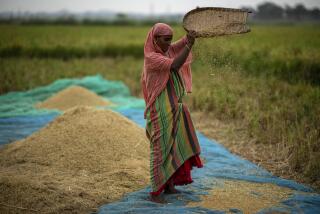Coffee Hits 8-Month Low as Traders See Price Pact’s End
- Share via
LONDON — Coffee prices sank to eight-month lows Tuesday as traders anticipated the collapse of a 25-year-old pact limiting exports by coffee-producing countries will unleash a greater supply on the market.
Coffee for delivery in September dropped $143 (90 British pounds) to $1,352 (850 pounds) per metric ton. Before it became evident that the 74-nation agreement would fail, prices had held above $1,590 (1,000 pounds) a ton.
The collapse of the price pact represents the latest failure in a long series of crashed commodity agreements.
Consumers are likely to be the big winners, said analysts, who predict a possible price war in the coffee market. Shoppers can expect a substantial drop in the price they pay for coffee at supermarkets and grocery stores as coffee exporters step up sales.
There are strong indications some of the Latin American producers are sitting on big stockpiles of coffee beans, analysts say.
On Monday, the International Coffee Organization decided to suspend for two years the export quotas it had used to regulate supplies to consumer countries. The move reflected the failure of a year of negotiations between a group led by Brazil, the leading producer, and another led by the United States, the top consumer.
The United States, backed by producers of milder coffees, wanted to be allowed to buy more mild coffee, but producers of robusta and other strong coffees complained that such a shift would cut their market share.
Price War Expected
The ICO members also clashed over the producers’ sales of coffee to countries outside the pact--mainly in the East Bloc and Middle East--at rates cheaper than those paid by member countries.
Analysts say the collapse of the agreement effectively leaves world coffee prices at the mercy of the free market.
“With the weight of coffee in the world, it seems to me that a price war could break out,” said Tony Wood, the director of Rwandex, a private coffee-trading firm in Kigali, the capital of the small central African state of Rwanda.
Analysts say the two-year suspension of export quotas will bring large supplies of increasingly popular mild arabica coffee onto the market and hit robusta prices even harder.
Falling coffee prices spell serious trouble for some of the indebted countries in Africa and Latin America. African producers worry that a price collapse will pare their meager foreign exchange earnings still further.
Only a few countries, such as Kenya and Tanzania, which sell the premium arabica beans favored by the choosey consumers of Europe and North America, reckon they will cope.
More to Read
Sign up for Essential California
The most important California stories and recommendations in your inbox every morning.
You may occasionally receive promotional content from the Los Angeles Times.













